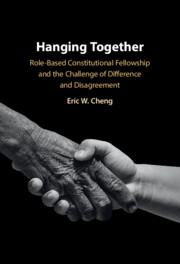 Hanging Together
Hanging Together Book contents
- Hanging Together
- Hanging Together
- Copyright page
- Contents
- Acknowledgments
- 1 Introduction
- 2 Aiming Too High, Aiming Too Low
- 3 Fellowship’s Forefather
- 4 Broadening the Base
- 5 Three Dimensions of Trust
- 6 Principled Pragmatists, Principled Purists, and the Liberal Democratic Front
- 7 Talking, Shouting Back, and Listening Better
- 8 Justifying (and Constraining) Salutary Hypocrisy
- 9 Facilitating Fellowship
- 10 Conclusion
- Index
7 - Talking, Shouting Back, and Listening Better
Published online by Cambridge University Press: 07 July 2022
- Hanging Together
- Hanging Together
- Copyright page
- Contents
- Acknowledgments
- 1 Introduction
- 2 Aiming Too High, Aiming Too Low
- 3 Fellowship’s Forefather
- 4 Broadening the Base
- 5 Three Dimensions of Trust
- 6 Principled Pragmatists, Principled Purists, and the Liberal Democratic Front
- 7 Talking, Shouting Back, and Listening Better
- 8 Justifying (and Constraining) Salutary Hypocrisy
- 9 Facilitating Fellowship
- 10 Conclusion
- Index
Summary
Chapter 7 discusses how trust can emerge in the general citizenry. Engaging with Danielle Allen’s iteration of “political friendship” and its critics, this chapter argues that a division of labour between the practices of “talking” and “shouting back” among the underprivileged, the oppressed, and their allies can counteract the social domination problem. Shouting back (aggressive civic disruption) makes it harder for the privileged and the dominant to claim ignorance about the persistence of injustices, while talking can promote trust between the underprivileged, the oppressed, and their allies on the one hand and “unwitting oppressors” and “softer complicit oppressors” on the other hand. Distinguishing among forms of talking, this chapter shows that the practice and revision of good manners should be the primary vehicle to cultivate trust. In addition, this chapter argues that allies should strive to “listen well” – to afford the underprivileged and the oppressed a sense of recognition when such recognition is all too rare, and to discourage unwitting oppressors and softer complicit oppressors from aligning politically with “harder complicit oppressors” and “proud oppressors.”
Keywords
- Type
- Chapter
- Information
- Hanging TogetherRole-Based Constitutional Fellowship and the Challenge of Difference and Disagreement, pp. 115 - 140Publisher: Cambridge University PressPrint publication year: 2022
